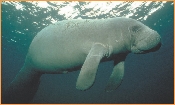Nouns
A noun names a person, place, or thing. There are different kinds of nouns.
| COMMON AND PROPER NOUNS | EXAMPLES | ||||||||||
|---|---|---|---|---|---|---|---|---|---|---|---|
| A common noun names any person, place, or thing. | A teenager sat by the ocean and read a book. | ||||||||||
| A proper noun names one particular person, place, or thing. The important words in a proper noun start with a capital letter. | Daniel sat by the Atlantic Ocean and read Save the Manatee.
A manatee | ||||||||||
| SINGULAR AND PLURAL NOUNS | EXAMPLES | ||||||||||
| A singular noun names one thing. A plural noun names more than one thing. | |||||||||||
| Follow these rules to make a noun plural: | |||||||||||
| • Add -s to most nouns. |
| ||||||||||
| • If the noun ends in x, ch, sh, s, or z, add -es. |
| ||||||||||
| • Some nouns change in different ways to show the plural. |
| ||||||||||
| POSSESSIVE NOUNS | EXAMPLES | ||||||||||
| A possessive noun shows ownership. It often ends in ‘s. | Daniel‘s book was very interesting. | ||||||||||